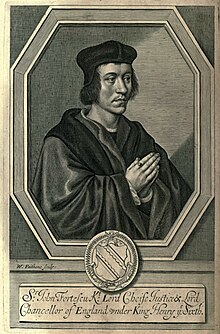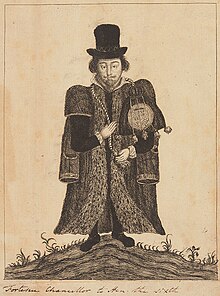
Back جون فورتسكو (قاضي) Arabic جون فورتسكو ARZ John Fortescue (Jurist) German John Fortescue Basque John Fortescue Finnish John Fortescue (juge) French John Fortescue Italian ジョン・フォーテスキュー Japanese Ioannes Fortescue Latin Фортескью, Джон Russian
Sir John Fortescue | |
|---|---|
 A portrait of Fortescue by William Faithorne published in 1663 inscribed "Sr John Fortescu Kt Lord Cheife Justice & Lord Chancellor of England vnder King Henry ye Sixth" | |
| Chief Justice of the King's Bench | |
| In office 25 January 1442 – Easter term 1460 | |
| Appointed by | Henry VI |
| Preceded by | John Hody |
| Succeeded by | John Markham |
| Personal details | |
| Born | c. 1394 Norris, North Huish, Devon, England |
| Died | 1479 (aged 84–85) |
| Resting place | St. Eadburgha's Church, Ebrington, Gloucestershire, England 52°3′28.98″N 1°44′0.92″W / 52.0580500°N 1.7335889°W |
| Alma mater | Exeter College, Oxford |


Sir John Fortescue (c. 1394 – December 1479), of Ebrington in Gloucestershire, was Chief Justice of the King's Bench and was the author of De Laudibus Legum Angliae (Commendation of the Laws of England),[2] first published posthumously circa 1543, an influential treatise on English law. In the course of Henry VI's reign, Fortescue was appointed one of the governors of Lincoln's Inn three times and served as a Member of Parliament from 1421 to 1437.[3] He became one of the King's Serjeants during the Easter term of 1441, and subsequently served as Chief Justice of the King's Bench from 25 January 1442 to Easter term 1460.[4][5][6]
During the Wars of the Roses, Henry VI was deposed in 1461 by Edward of York, who ascended the throne as Edward IV. Henry and his queen, Margaret of Anjou, later fled to Scotland. Fortescue remained loyal to Henry, and as a result was attainted of treason. He is believed to have been given the nominal title of Chancellor of England during Henry's exile. He accompanied Queen Margaret and her court while they remained on the Continent[2] between 1463 and 1471, and wrote De Laudibus Legum Angliae for the instruction of young Prince Edward. After the defeat of the House of Lancaster, he submitted to Edward IV who reversed his attainder in October 1471.
- ^ P. W. Montague-Smith, ed. (1968), Debrett's Peerage, Baronetage, Knightage and Companionage 1968: With Her Majesty's Royal Warrant Holders: Comprises Information Concerning the Peerage, Privy Councillors, Baronets, Knights, and Companions of Orders, Surrey: Kelly's Directories, p. 461, OCLC 8972816
- ^ a b One or more of the preceding sentences incorporates text from a publication now in the public domain: Chisholm, Hugh, ed. (1911). "Fortescue, Sir John". Encyclopædia Britannica. Vol. 10 (11th ed.). Cambridge University Press. p. 678.
- ^ "FORTESCUE, John (d.1479), of Devon". History of Parliament Online. The History of Parliament Trust. Retrieved 22 December 2015.
- ^ E. W. Ives (22 September 2005). Oxford Dictionary of National Biography. Retrieved 23 July 2023.
- ^ J.S. Roskell; L. Clark; C.Rawcliffe, eds. (1993). The History of Parliament: the House of Commons 1386-1421. Retrieved 23 July 2023.
- ^ John Lambrick Vivian, ed. (1895). The Visitations of the County of Devon: Comprising the Herald's Visitations of 1531, 1564, & 1620. Exeter: H. S. Eland. p. 353. Retrieved 23 July 2023.
© MMXXIII Rich X Search. We shall prevail. All rights reserved. Rich X Search